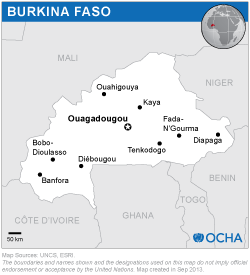The mission included two experts from UN-SPIDER who were accompanied by experts from the Algerian Space Agency (ASAL), the French Centre National d’Etudes Spatiales (CNES), and the UNOCHA Regional Office for West Africa.
The mission included meetings with representatives from eight government agencies, four organisations from the United Nations and one regional institution.
Several government institutions in Burkina Faso already possess the capacity to work with space-based information and technology such as global navigation satellite systems (GNSS), satellite imagery and geographical information systems (GIS). Many institutions already receive in one or the other way satellite-derived data in the form of NDVI or meteorological information.
However, the National Council for Emergency Relief and Rehabilitation (CONASUR does not have a formalized information system nor uses modern technologies such as GIS to carry out its functions.
The Ministry of Health operates a fast and efficient information flow system targeting potential epidemics linking villages in rural areas and the Ministry of Health in Ouagadougou via health posts and regional offices.
The Government of Burkina Faso is developing a multi-risk contingency plan. The plan is being prepared by the Government with relevant stakeholders, although without the participation of the Permanent Secretariat of the Council for Environment and Sustainable Development (SP/CONEDD), and points out the information need for early warning and emergency response. However, in its present draft version, this plan fails to point out the potential of space-based technology and information for disaster management other than a reference to the usual hydro-meteorological data already in use.
The Famine Early Warning Systems Network (FEWSNET) country office in Burkina Faso receives regular information on the development of the vegetative cover in the form of NDVI (Normalized Differenced Vegetation Index) data, derived from AVHRR sensor (NOAA), as well as other climate and vegetation related datasets. The data is processed by NASA and USGS and delivered to FEWSNET in a ready-to-use GIS format. At the regional level, there is a collaboration between FEWSNET and AGRHYMET.
SP/CONEDD, which is part of the Ministry of Environment, implements the Programme Nationale de Gestion de l’Information sur le Milieu (PNGIM). PNGIM is a network of over 30 institutions, mainly governmental and academic, including CONASUR, IGB, DM and DGPSA. Its main objective is to promote the use of information, specifically geo-information, for environmental management by improving accessibility and adopting common data standards to improve compatibility.
Currently no Government institution is in the position to activate the International Charter: Space and Major Disasters.
- Incorporation of the access to and use of space-based information and technology elements into the national multi-risk contingency plan that is currently being developed. In particular to promote its use in risk mapping (hazard and vulnerability assessment);
- Awareness raising campaigns targeting decision-makers regarding the benefits of using space-based inforamtion, the capacity available in the country and the potential regional and international mechanisms and resources which could be drawn on;
- Capacity-building activities in the fields of remote sensing, GNSS and GIS for different institutions, depending on their role and level. In particular to strengthen the skills of staff in CONASUR and in the Civil Protection Directorate;
- The revision of existing disaster-related information systems, namely the system employed by CONASUR and DGPSA/SAP by integrating modern telecommunication elements to considerably speed up the flow of information from the field to headquarters;
- CONASUR to establish contacts with international space-based information mechanisms for emergency purposes such as the International Charter: Space and Major Disasters;
- The nomination of a national focal point to coordinate inter-institutional activities in Burkina Faso with UN-SPIDER and the space-community.


